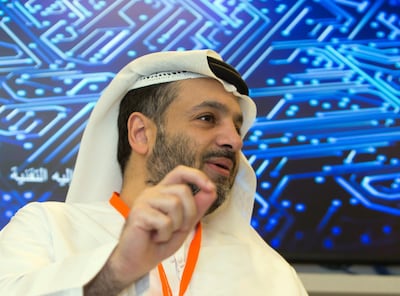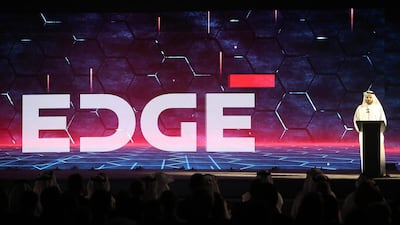Abu Dhabi's new defence group is to rapidly develop new systems to deal with threats by militant groups and armies alike as it bids to become an exporter of cutting-edge technology.
Edge chief executive and managing director Faisal Al Bannai said AI-powered defence systems are among the new areas the conglomerate of 25 state-owned companies is exploring.
Smarter weapons are needed to tackle militant groups that use crude homemade weapons such as drones and hide among civilians, he said.
Two drone attacks on Aramco production facilities in Saudi Arabia in September took more than half of the world’s largest crude exporter’s production temporarily offline.
"The drones that were built [to attack Aramco assets] were made with off-the-shelf components," Mr Al Bannai said in an interview with The National.
"There are multiple examples available of commercial technology that can be stitched together very fast and can cause a lot of damage.
“The future battlefield is yes, large-scale wars of full armies on full armies. But as you see in this region around us, you also see a lot of organised armies with militia ties.
"They’re still backed by state actors but they are militia style, they hide in urban cities, they hide behind civilians... you need different technologies and intelligence to deal with it.”
Mr Al Bannai spoke to The National at Dubai Airshow two weeks after Sheikh Mohamed bin Zayed, Crown Prince of Abu Dhabi and Deputy Supreme Commander of the Armed Forces, unveiled one of the Middle East's biggest defence groups.
Edge is comprised of companies employing about 12,000 people and manufacturing everything from small arms to home-grown military vehicles such as the NIMR.
“The goal is to achieve national sovereignty on very specific critical defence capabilities. That’s the right of every country,” said Mr Al Bannai, who founder the Abu Dhabi cybersecurity contractor DarkMatter and Axiom telecoms in the 1990s.

With persistent geopolitical tension, demand for military equipment is increasing defence spending. Global military spending rose to $1.8 trillion, the highest expenditure since such data was reliably recorded starting in 1988, according to the Stockholm International Peace Research Institute.
“The UAE spends a lot of money to defend itself. That money will be re-routed to build technologies to defend itself," and to sell to allies, Mr Al Bannai said, as the country proceeds with its strategy to build a knowledge-based economy amid the push to diversify away from oil.
The mandate for Edge is to develop advanced technology at a faster pace than large legacy defence firms, according to Mr Al Bannai.
“What we learned [at DarkMatter] is there’s always a way to develop at speed and in a reasonable, cost-effective manner,” he said.
Defence is “an industry which is really known to take an extremely long time and cost a tonne of money to do things”.
He said Edge is “investing heavily” in autonomous capabilities “whether for drones, cars, ships, or drones for package delivery. Autonomous is autonomous”.
Mr Al Bannai named quantum computing as one of the biggest emerging opportunities and “an area we will be aggressively investing in”.
He cautioned, however, that quantum computing is still a very new - and relatively unproven - field.
The company is also making investments in technology for electronic warfare including hardware-software like sensors, cameras and radar.
“It’s no longer 100 tanks and you know where you’re shooting,” Mr Al Bannai said. “You need much more pinpointed accuracy” which in turn will reduce the number of casualties in wartime.
Edge is on the lookout for tie-ups with companies from defence giants like Lockheed Martin - which it already has a joint venture with to maintain Black Hawk helicopters in Al Ain, among other projects - to acquiring small and medium-sized technology firms.
Bringing together SMEs with engineers “who are acquainted with mission critical systems” can speed up commercial applications.
He credits the Mohammed bin Rashid Space Programme and the nuclear power plant at Barakah for enticing a new crop of UAE students to study space and nuclear physics, among other now in-demand jobs domestically, and sees Edge as playing a similar role.
“Normally we are not a nation that migrates. The industries here are what we will study,” he said.
Edge is a critical component to linking academia, like the new Mohamed bin Zayed University of Artificial Intelligence, to jobs in advanced technology and in attracting international talent to the UAE.
“What these capabilities are today are different from what they were 10 years ago and they will be different again tomorrow.”


